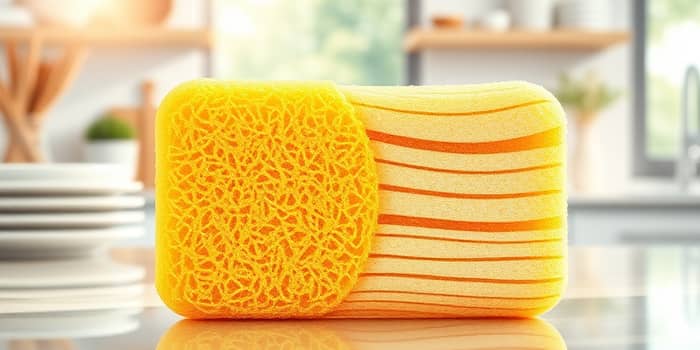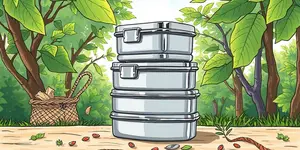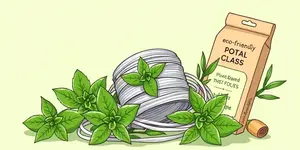In a world awash with plastic waste, switching to greener alternatives in even the smallest household item can spark lasting change. Your kitchen sponge—once a pipeline for microplastics into our oceans—can become a powerful symbol of sustainability.
Plant-based sponges harness the strength of nature to tackle everyday messes, proving that eco-friendly products can outperform their synthetic counterparts. Read on to discover how these innovative tools not only elevate your cleaning routine but also protect the planet.
The rise of sustainable cleaning tools
Consumers around the globe are increasingly demanding products that align with their values. Traditional sponges, usually derived from petroleum-based plastics, contribute to microplastic pollution and rapidly deteriorate, encouraging a cycle of fast consumption and waste.
By contrast, plant-based sponges are designed with the environment in mind. Made from materials like loofah, coconut fiber, cotton, and wood cellulose, they offer a durable and compostable alternative. This shift reflects a broader movement towards renewable plant-based natural materials and responsible sourcing.
What are plant-based sponges?
At their core, plant-based sponges blend two distinct layers to maximize functionality: a soft, absorbent side and an abrasive side for scrubbing. The absorbent layer is often crafted from wood cellulose or cotton, while the scrub surface may feature loofah or coconut fibers.
These sponges boast several standout qualities:
- 100% free of plastics and chemicals
- fully compostable and biodegradable
- Dual-sided design for versatile cleaning tasks
- Plastic-free packaging by most leading brands
Unlike conventional alternatives that may release harmful molecules or microplastics, plant-based sponges break down naturally after disposal, enriching soil rather than cluttering landfills.
Performance and usability in the kitchen
One common concern about sustainable products is whether they can match the performance of traditional options. In this case, plant-based sponges hold their own—and often surpass expectations.
Absorbency tests show these sponges can absorb 10 to 15 times their weight, far exceeding the typical 4–6 times capacity of plastic variants. They dry quickly between uses, reducing bacterial growth and odors.
Coconut fiber offers medium-to-strong scouring power, effective on stuck-on debris without scratching surfaces like nonstick pans or glass. It is gentle on all kitchen surfaces, while Egyptian loofah provides a softer scrub for delicate tasks.
Durability is another plus. A well-cared-for plant-based sponge can lasts three to twelve months, saving money over time despite a slightly higher upfront cost. Many users cut larger sponges in half to speed drying and extend their lifespan even further.
Environmental and health benefits
Beyond performance, plant-based sponges deliver tangible environmental improvements. They derive from rapidly renewable resources such as loofah vines, coconut husks, and wood pulp, supporting a circular economy while reducing reliance on fossil fuels.
Studies show a significant reduction in carbon footprint compared to plastic alternatives, and each sponge you compost prevents microplastic pollution in landfills and waterways. With no microplastics or synthetic toxins released during use or disposal, these sponges are safer for aquatic ecosystems and for your family.
Health-conscious households appreciate that these sponges are free from synthetic dyes, antibacterial agents, or chemical residues. They promote a naturally hygienic environment, perfect for homes with children, pets, or sensitive skin.
Choosing and caring for your plant-based sponge
Selecting the right sponge starts with examining materials. Read labels to ensure the scrub layer is also plastic-free—some eco-branded sponges still incorporate synthetic fibers.
To maximize longevity and cleanliness:
- Rinse thoroughly after each use to remove food particles.
- Squeeze out excess water and store upright to air dry.
- Occasionally refresh by soaking in warm, soapy water and rinsing well.
- Compost when it begins to break down or become too worn.
Proper care ensures your sponge remains effective and hygienic, minimizing waste and maintenance effort.
Real-user experiences and tips
Feedback from households that have made the switch highlights both practical advantages and emotional satisfaction. Many report being impressed with scrubbing power, noting that coconut fiber surfaces tackle grease stains with ease.
Users also appreciate the peace of mind that comes from a fully plant-based product. Some divide larger sponges into smaller pieces to dedicate one segment to dishes and another to countertops. Others share creative tips like placing the sponge on a small wooden stand to improve air circulation and speed drying.
Communities on social media celebrate these sponges as part of their zero-waste journey, often showcasing how a simple kitchen swap can lead to broader changes in household habits.
The future of eco-conscious cleaning
This sponge represents more than just a cleaning tool; it embodies a shift towards sustainable consumer habits. As awareness of plastic pollution grows, products like these will play an increasingly central role in our daily routines.
By investing in a simple, yet powerful, plant-based sponge, you make a statement: you value innovation that honors nature, you embrace products with a minimal environmental footprint, and you expect top performance in every aspect of life.
Transform your kitchen routine today. Embrace the cleaning revolution and discover firsthand how plants can out-scrub synthetics—making your home sparkle while preserving the planet.
References
- https://zerowastestore.com/blogs/sustainable-living/reasons-to-switch-to-biodegradable-kitchen-sponges
- https://www.reviewed.com/cleaning/features/do-natural-cleaning-sponges-work-effectively
- https://lucentglobe.com/en-us/blogs/news/kitchen-sponge-vs-plant-based-sponge
- https://zerowastestore.com/blogs/sustainable-living/biodegradable-kitchen-sponges-vs-traditional
- https://justasmallchange.com/natural-plant-based-sponge-eco-friendly-scrubbing/
- https://content.ces.ncsu.edu/extension-gardener-handbook/18-plants-grown-in-containers
- https://www.elementbrooklyn.com/products/plant-based-kitchen-sponges










